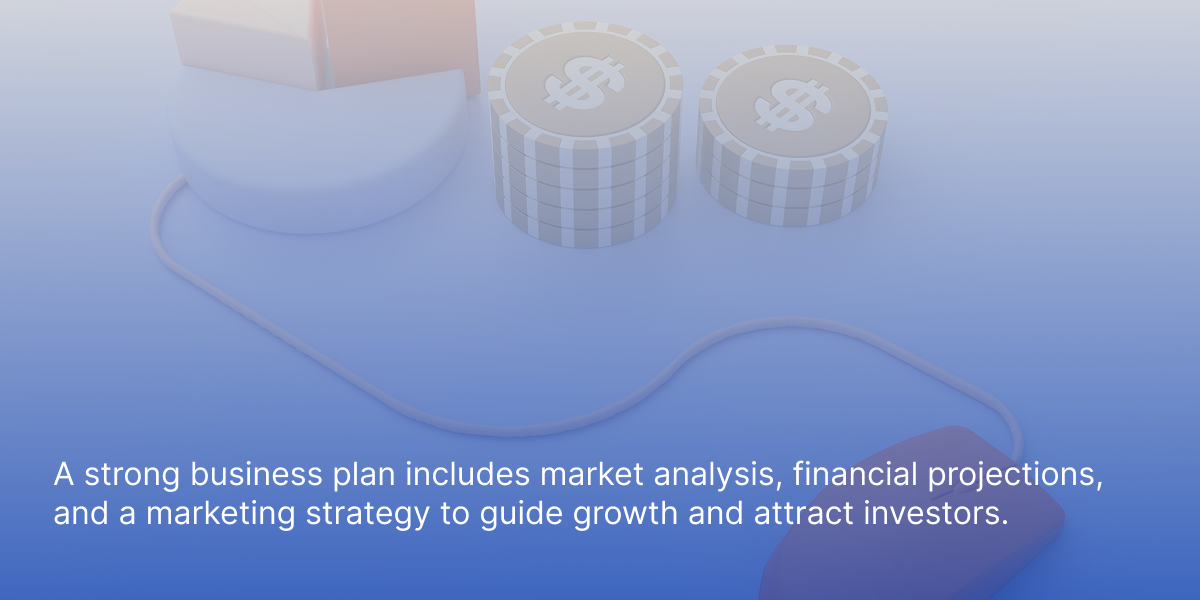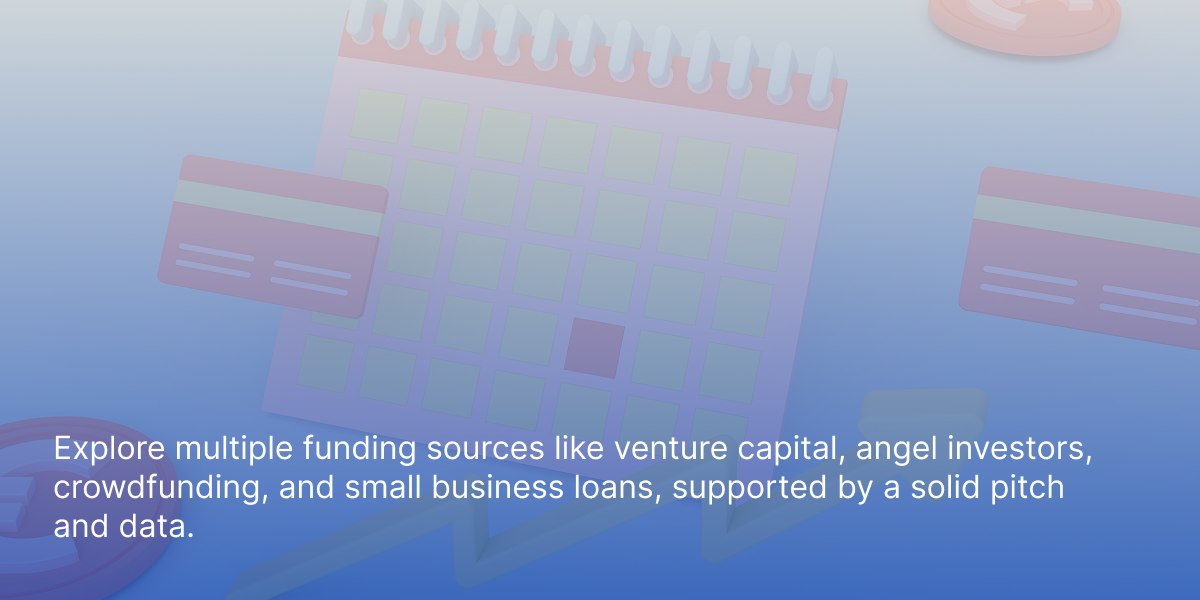Founding a startup involves a series of deliberate steps. This guide covers everything you need to know to start a successful business in 2025. From discovering a viable startup idea, conducting market research, crafting a solid business plan, securing funding, to building a strong team-we’ve got you covered.
Key Takeaways
- Identify a strong startup idea that addresses an unmet need by conducting thorough market research and validating concepts with real user feedback.
- Craft a detailed business plan outlining market analysis, financial projections, and marketing strategies to guide your startup’s journey and attract investors.
- Build a strong team with complementary skills and shared vision, while focusing on developing a Minimum Viable Product (MVP) to validate your concept and refine based on user feedback.
Finding Your Startup Idea
The first and perhaps the most critical step in launching a startup is finding your startup idea. This idea must address an unmet need or offer a solution to a problem that people are willing to pay for. Identifying such a business idea involves keen observation and a bit of creativity.
Brainstorming sessions can be incredibly productive; focus on generating a high quantity of ideas before narrowing them down. During these sessions, consider emerging market trends and how they align with potential business opportunities. Once you have a list, start validating each great idea by researching competitors and understanding the demand and ease of doing business in that sector.
A practical approach to refining your startup idea is by launching initial versions of your product or service in a limited way. This can be done through a simple landing page to gauge interest and gather initial feedback from real users. Such feedback provides hard evidence of the merit of your idea and can significantly shape its development.
Moreover, understanding your competition is crucial. Monitoring competitors allows you to stay informed about similar concepts and discover ways to differentiate your business. This not only helps in refining your idea but also prepares you to address investor questions more effectively.
Read more in our previous article:
Mastering MVP in Product Development: Key Strategies for Success
Finally, remember that the primary condition for a startup’s success is offering a solution to a significant problem. Ensuring your idea meets this criterion lays a strong foundation for your startup’s success.
Conducting Market Research
Market research is the backbone of any successful business venture. Understanding your potential customers and the market environment helps you avoid costly mistakes and improve your business idea. Effective market research involves both primary and secondary methods.
Primary research directly gathers data from potential customers through:
- surveys
- questionnaires
- focus groups
- in-depth interviews
This method provides nuanced insights into customer needs and preferences, helping validate your valuable advice startup idea.
Secondary research, on the other hand, uses existing data to understand broader market trends. This can include reports, studies, and publicly available data, offering context without the cost of primary data collection.
Identifying your target market is a crucial step in this process. It helps determine demand, market size, and potential pricing strategies. Analyzing both direct and indirect competitors reveals market gaps and informs your product positioning in a fair market.
A SWOT analysis can be particularly useful, helping you identify your strengths, weaknesses, opportunities, and threats. This comprehensive understanding of market dynamics and competitor strategies ensures you are well-prepared to enter the market.
Finally, competitive analysis allows you to learn from existing businesses and define a unique competitive advantage. Understanding the strengths and weaknesses of your competition allows you to better position your product or service in the market.
Crafting a Solid Business Plan
A well-structured business plan serves as a roadmap for managing and growing your startup. It typically includes sections such as:
- An executive summary
- Company description
- Market analysis
- Financial projections.
The financial projections section is particularly important, as it should include detailed budgets and forecasts for the upcoming years. These projections not only guide your funding needs but also demonstrate the viability of your startup to potential investors.
Market analysis within your business plan should encompass industry trends and competitive landscape insights. This section helps investors understand the market opportunity and how your startup plans to capitalize on it.
A lean startup business plan is a concise format that summarizes essential business elements quickly. This can be particularly useful in the early stages when you need to present your idea to potential investors or partners.
Your business plan should also outline your marketing strategy, detailing your unique value proposition, target audience, and the marketing channels you will use. This ensures that your marketing efforts are aligned with your overall business goals.
Finally, a robust business plan serves as a valuable tool for communicating your vision, strategy, and financial needs to stakeholders. It provides a clear path forward, helping you stay focused and organized as you start your startup journey.
Choosing the Right Business Structure
Choosing the right business structure is a critical decision that affects your daily operations, tax obligations, and personal liability. Common structures for startups include sole proprietorships, limited liability companies (LLCs), and corporations such as C-corporations and S-corporations.
LLCs are a popular choice for startups because they separate business assets from personal assets, offering liability protection without the complexity of a limited liability company. Sole proprietorships, while simpler to set up, do not offer this level of protection.
Corporations, such as C-corporations, face double taxation where profits are taxed at the corporate level and dividends taxed at the shareholder level. However, they can be beneficial for startups planning to raise significant venture capital.
Your choice of legal structure will impact not just your tax treatment but also your ability to raise capital and expand your business. Carefully considering these factors and consulting with legal and financial advisors are crucial to making the best decision for your new business, including obtaining an employer identification number and establishing a legal entity.
Securing Funding for Your Startup
Secure funding is often one of the most daunting challenges for startup founders. However, there are numerous options available, including:
- Venture capital
- Angel investors
- Crowdfunding
- Small business loans.
Venture capitalists seek startups with high growth potential and reliable data from market research to support their funding decisions. A well-structured pitch deck is essential for conveying your startup’s value, including key details such as:
- Market opportunity
- Competitors
- Financial projections
- Team expertise
Angel investors can be approached through warm introductions from colleagues or friends, and it’s beneficial to tailor your communication based on their interests and investment thesis. Family angel investors and crowdfunding platforms allow you to raise capital from a large group of individuals, demonstrating demand and validating your startup idea.
Bootstrapping, or investing personal funds, is another option that allows you to maintain control over your startup’s journey. Small business startup loans, including those from the Small Business Administration (SBA), are designed to support businesses with limited or no traditional loan history.
Combining different funding options at various stages can optimize growth and help you navigate financial challenges. Venture debt, for example, refers to bank loans for companies between rounds of venture capital funding.
Convertible securities are another useful tool, allowing startups to raise money while postponing valuation negotiations. Exploring these diverse funding options helps you secure the necessary resources to turn your startup idea into a successful business, including future equity.
Building a Strong Startup Team
A strong startup team is one of the most important factors for business success. Issues related to the team account for approximately 23% of successful startups fail, making it crucial to assemble a skilled and cohesive group to ensure the startup’s success.
Start by leveraging your existing network and attending local startup events to find a suitable co-founder. Ensure that your co-founders have complementary skills and a shared vision to start a startup.
Equity distribution among co-founders should be agreed upon based on contributions and roles in the startup. Diverse founding teams can enhance skills, but alignment of expectations is crucial to avoid challenges.
Recruit early adopters by offering equity compensation and conducting comprehensive reference checks to ensure potential hires fit well with the company culture. Open communication and making team members feel valued are essential for maintaining a positive company culture.
Lean hiring strategies can be particularly effective in the early stages, focusing on filling only critical skill gaps. This approach helps manage costs and ensures that your team is equipped to handle the startup’s initial challenges.
Ultimately, building a strong startup team is about finding the right mix of skills, experience, and cultural fit. Prioritizing these elements sets the stage for a successful startup journey.
Developing a Minimum Viable Product (MVP)
Developing a Minimum Viable Product (MVP) is a strategic approach to quickly launch a product with minimal features that still provide value. This allows you to attract early adopters and validate your product concept.
The focus when creating an MVP should be on core functionality, ensuring that the product meets user expectations and addresses their needs. A well-defined user flow enhances the design process and ensures usability and reliability.
After launching an MVP, gathering feedback from early users is vital to assess its acceptance in the market. Customer feedback can be utilized to fine-tune and improve the product, ensuring it meets the target market’s needs.
Engaging with early adopters can provide critical insights into how the product can be improved. Analyzing usage data, conversion rates, and customer feedback is essential to refine your MVP and prepare for a full product launch.
Offering early access or a beta launch can create excitement and gather valuable feedback before the full product launch. Focusing on early adopters and iterating based on their feedback helps you develop a successful MVP that paves the way for your startup’s success.
Read more about this in our previous article
MVP for Startup – A Step-by-Step Guide to Building Smart in 2025
Creating a Marketing Strategy
A solid marketing strategy is crucial for reaching your target audience and promoting your startup. Start by establishing a strong brand presence through a consistent voice and visual representation.
Defining your target market is essential, as it helps tailor your marketing efforts to specific demographics. Your marketing plan should detail your business’s unique value proposition, target audience, and the marketing channels you will use.
For online visibility, developing an effective digital presence is vital. This includes:
- Creating a well-structured website
- Engaging content for social media platforms
- Utilizing public relations to enhance your startup’s image and reach broader audiences through search engine optimization and search engine.
Referral marketing incentivizes existing customers to promote your business, leveraging word-of-mouth as a powerful tool for growth to reach customers. Setting measurable objectives, including specific revenue targets, and key performance indicators (KPIs) is crucial for tracking the effectiveness of your marketing activities.
Finally, establishing a budget for marketing initiatives helps prevent overspending and maximizes returns on investment. Developing a comprehensive marketing strategy allows you to effectively reach your target market and drive your startup’s success.
Protecting Your Intellectual Property
Protecting your intellectual property and ensuring legal protection is essential for maintaining your startup’s competitive edge. Intellectual property often represents the essence of your business, and neglecting to protect it can lead to severe repercussions. Investors prefer startups that have protections in place for their innovations, as it demonstrates a commitment to safeguarding valuable assets.
The process of obtaining a patent can be lengthy and complex, requiring detailed submissions and examinations. Filing for a trademark helps secure your brand identity and prevents others from using similar marks. Copyright automatically protects original work, but registration facilitates legal enforcement.
Non-disclosure agreements are essential for protecting trade secrets during discussions with potential partners. Ensuring that all contributors are signing contracts that clarify ownership of created work helps avoid forfeiting intellectual property rights.
Managing Finances and Cash Flow
Managing finances and cash flow is crucial for the sustainability of your startup. Key points to consider include:
- Maintaining organized financial records helps you understand cash flow and prepare for investor scrutiny.
- Outsourcing accounting services can be beneficial, but it’s essential to choose providers who understand your specific business needs.
- Building strong relationships with banks can provide crucial support in financial emergencies, including the need for a business bank account.
Key financial management strategies include:
- Invoicing clients promptly to improve cash inflow and better manage financial resources.
- Using credit cards wisely to enhance cash flow management by delaying payments without incurring additional costs.
- Establishing rules for spending to prevent fraud and clarify expenses among team members.
Having a sufficient cash buffer is essential for covering payroll and managing unforeseen financial challenges. Finally, detailed budgeting rules help maintain financial discipline and avoid overspending. Managing your finances effectively ensures the financial health of your startup and supports its growth.
Summary
Embarking on the journey to found a startup in 2025 is an exhilarating endeavor filled with opportunities and challenges. From identifying a viable business idea to securing funding, each step is crucial in transforming your vision into a successful business. We’ve explored the importance of market research, crafting a solid business plan, choosing the right business structure, and building a strong startup team. Additionally, developing an MVP, creating an effective marketing strategy, protecting your intellectual property, and managing finances are all essential components that contribute to your startup’s success.
Remember, the path to a successful startup is seldom straightforward, but with careful planning, dedication, and a strategic approach, you can navigate the complexities and achieve your entrepreneurial goals. Embrace the journey, learn from each step, and stay committed to your vision. Your dream of founding a successful startup is within reach—take the leap with confidence!
Frequently Asked Questions
How do I come up with a viable startup idea?
To come up with a viable startup idea, focus on identifying unmet needs and innovative solutions to current problems. Engage in brainstorming and validate your concepts through market research and user feedback to refine your idea effectively.
Why is market research so crucial for startups?
Market research is crucial for startups as it uncovers customer needs and market trends, helping you avoid costly mistakes. By understanding the landscape, you can refine your business idea and set yourself up for success!
What should I include in a business plan?
To create a powerful business plan, include an executive summary, company description, market analysis, financial projections, and a detailed marketing strategy. This comprehensive approach will guide you in effectively managing and scaling your startup.
How can I protect my startup’s intellectual property?
Protect your startup’s intellectual property by filing for patents, trademarks, and copyrights, and implementing non-disclosure agreements to protect your trade secrets. These steps will not only secure your innovations but also enhance your attractiveness to potential investors.
What are some effective ways to secure funding for my startup?
To secure funding for your startup, focus on creating a compelling pitch deck and proving market validation to attract venture capitalists, angel investors, or even crowdfunding. Take action now, and open the doors to your startup’s success!









